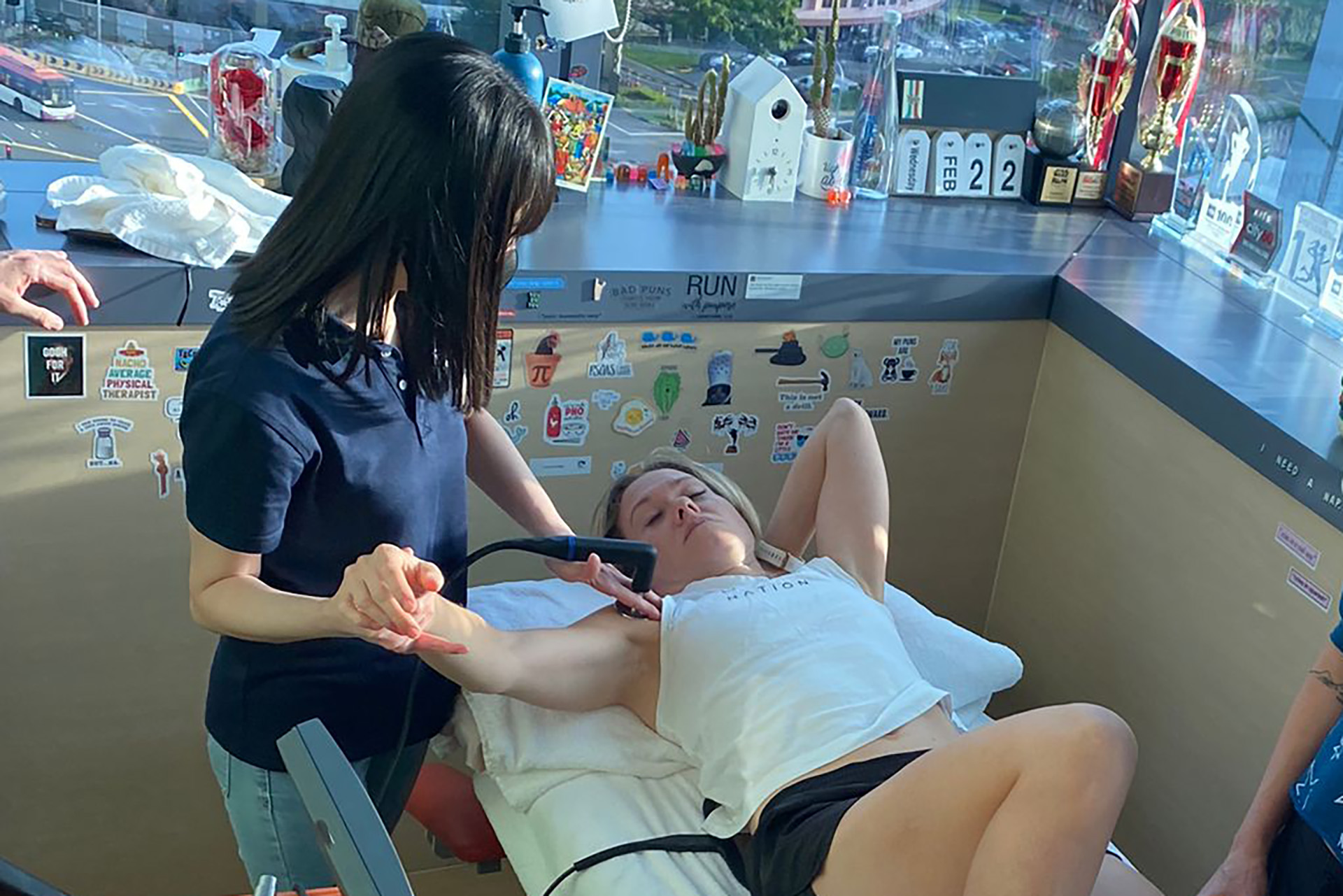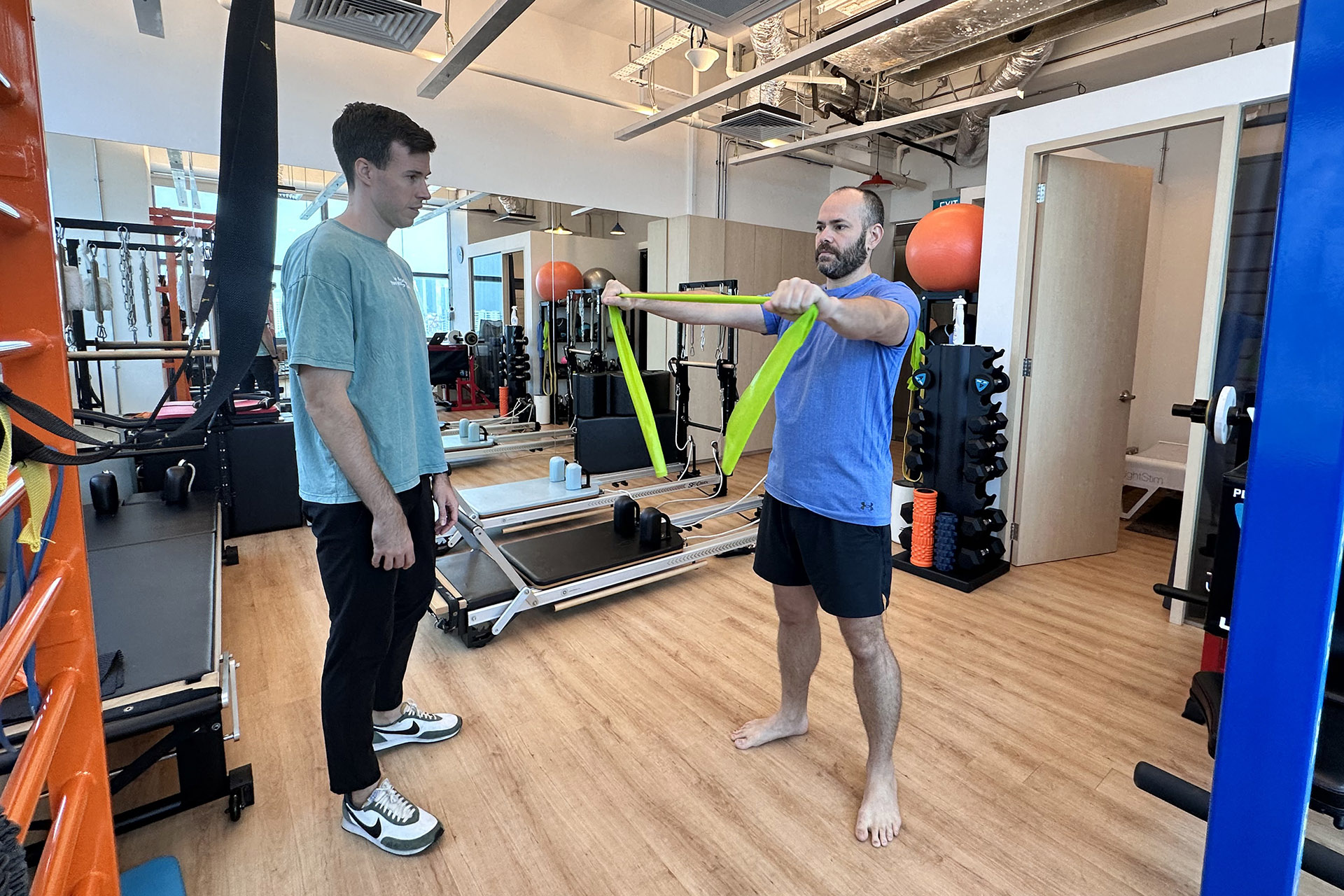Signs of Shoulder Impingement
If you’ve noticed a twinge in your shoulder while reaching for your morning coffee or lifting something heavy, don’t dismiss it as a minor inconvenience. It may start easy to ignore, but you might notice that the pain intensifies as the weeks go by, even when doing something as small as sleeping on your side. All of these may be early signs of shoulder impingement, a condition that affects millions worldwide and can significantly impact the quality of life if left untreated.
Shoulder impingement is a condition where the tendons of the rotator cuff become irritated and inflamed as they pass through the narrow space beneath the acromion (where the clavicle meets the shoulder blade). What may start as a slight irritation can become chronic pain, weakness, and reduced range of motion, particularly when performing overhead activities.
Shoulder impingement is one of the most common shoulder problems we see in our clinics and it’s not just athletes or manual laborers who are affected. We see patients from all walks of life, including office workers who spend long hours at their desks, developing shoulder impingement.

What sets shoulder impingement apart from other shoulder conditions, such as rotator cuff tears?
While shoulder impingement and rotator cuff issues often go hand in hand, they’re not the same. In shoulder impingement vs rotator cuff injuries, the key difference is that impingement is often a precursor to more severe rotator cuff damage. It’s like a warning sign that shouldn’t be ignored, like your body is sending you a signal to take care of it.
Diagnosis of Shoulder Impingement
At HelloPhysio, we don’t just examine the shoulder in isolation. We assess the entire kinetic chain, including posture, scapular movement, and core stability. Shoulder impingement is often the result of multiple factors working together, meaning we need to get a complete picture before developing an action plan.
One key aspect of the examination is assessing shoulder impingement external rotation. Limited external rotation can be a telling sign of impingement. It’s not just about pain; it’s about how the shoulder moves and functions. Common symptoms include pain when raising the arm, especially between 60 and 120 degrees, discomfort when reaching behind the back, and a dull ache extending from the shoulder to the side of the arm.

Once diagnosed, many patients ask, “Will shoulder impingement heal on its own?”
The answer, as you may expect, varies. While minor cases may improve with rest and lifestyle modifications, chronic shoulder impingement often requires professional intervention. The body has an amazing capacity to heal, but without addressing the underlying causes, the problem often persists or worsens over time.
The Road To Shoulder Impingement Recovery
So, what does shoulder impingement therapy entail? HelloPhysio’s approach is multifaceted, combining cutting-edge technology with hands-on techniques. One innovative treatment gaining traction is INDIBA® Activ, a noninvasive radiofrequency therapy that stimulates cellular regeneration and reduces inflammation. This advanced technology helps increase blood flow, offers shoulder impingement pain relief, and promotes tissue healing at a cellular level, providing relief and accelerating recovery.

Complementing INDIBA® Activ is Shockwave Therapy, another advanced shoulder impingement rehab technique in the physiotherapist’s toolkit. This technique uses high-energy sound waves to stimulate healing in the affected tissues in the acromion. Shockwave Therapy is particularly effective for chronic cases of shoulder impingement or when calcification is present, as it can help break down scar tissue and stimulate the body’s natural healing processes.
While these high-tech treatments are important in the recovery process, manual therapy remains an invaluable component of shoulder impingement rehabilitation. Skilled physiotherapists mobilize joints, release tight tissues, and restore proper shoulder mechanics via deep tissue massages or pilates.
Deep tissue massage for shoulder impingement plays a crucial role in treatment. This targeted technique helps release tension in the shoulder muscles, improving blood flow and reducing pain. Deep tissue massage can sometimes be uncomfortable, but its relief is often immediate and long-lasting when combined with our other treatment modalities.
As patients progress through their shoulder impingement recovery, many find Clinical Pilates an excellent complement to their treatment plan. Pilates for shoulder impingement is about more than just strengthening exercises. It retrains movement patterns, improves posture, and builds a strong foundation for overall shoulder health. It’s not just about intervening now; it’s about giving you the best shot at shoulder impingement prevention in the future.
Shoulder Impingement Recovery Time
With all these treatments, how long will it take to recover? This is often one of the first questions patients ask, and the answer can be challenging. Recovery time can vary significantly depending on the severity of the impingement, the patient’s overall health, and their adherence to the treatment plan. We might see significant improvement in mild cases in a few weeks. For more chronic conditions, a full recovery can take several months.
Even as the shoulder begins to heal, the journey to full recovery isn’t over yet. Now that there are less immediate pain concerns, your physiotherapist will focus on prevention. Prevention is more than just strengthening exercises; it’s about understanding proper body mechanics. Remember to stay active for those seeking shoulder impingement pain relief, but listen to your body. Incorporate shoulder-strengthening exercises into your routine, maintain good posture, and don’t ignore persistent pain or discomfort. And remember, early intervention is key.

HelloPhysio remains at the forefront, integrating new techniques with proven methods. For patients grappling with shoulder impingement, this commitment to comprehensive, evidence-based care offers the best chance for a full recovery and a return to pain-free movement.
The road to recovery from shoulder impingement may be challenging, but with the right approach, patience, and expert guidance, patients can look forward to regaining strength, mobility, and confidence in their shoulders.
